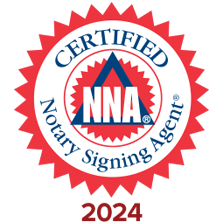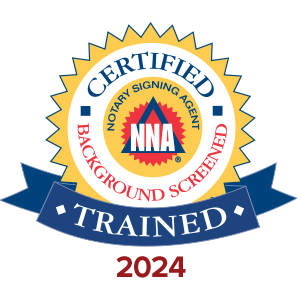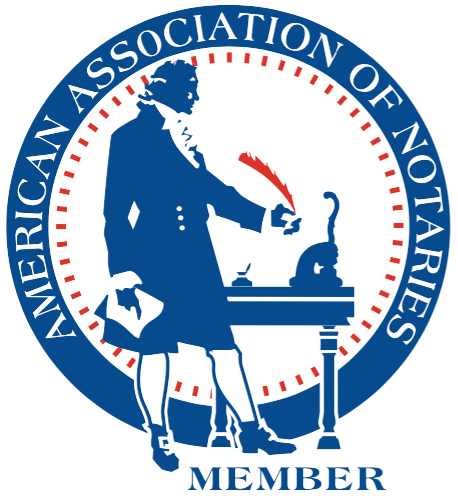In a bustling city like Los Angeles, the convenience of mobile notary services has become essential for individuals and businesses needing documents notarized. A mobile notary travels to the client’s location, offering flexibility and ease for notarizing important paperwork. But which documents commonly require notarization, and why is it necessary?
Whether you’re involved in a real estate transaction, a legal process, or handling personal affairs, there are many instances where a notary public’s services are required. In this article, we’ll explore some of the most common documents that require a mobile notary in Los Angeles and explain why notarization is important for ensuring legality and authenticity.

What is a Mobile Notary?
A mobile notary is a licensed notary public who travels to clients to notarize documents. Notarization involves verifying the identity of the signers and witnessing the signing of legal documents. This process ensures that all parties involved are acting willingly and that the document is authentic. In Los Angeles, mobile notaries offer a flexible, convenient option for those who cannot or prefer not to visit a notary office.
Common Documents That Require a Mobile Notary
1. Real Estate Documents
Real estate transactions frequently require notarization, and in Los Angeles, mobile notaries are often called upon to notarize a variety of real estate documents. These include:
- Deeds of Trust: A deed of trust is a legal document used in some states, including California, that secures a real estate transaction. It involves the transfer of legal title of a property to a trustee, which serves as security for a loan until the loan is paid off.
- Grant Deeds and Quitclaim Deeds: These deeds transfer property ownership. A grant deed is used when the seller guarantees that the title to the property is clean, while a quitclaim deed transfers the owner’s interest in the property without guaranteeing a clear title.
- Mortgage Documents: Lenders often require mortgage documents to be notarized to ensure that the borrower understands and agrees to the terms of the loan.
- Refinancing Documents: When homeowners refinance their properties, notarized documents are typically required to secure the new loan.
A mobile notary ensures that all parties involved in real estate transactions can conveniently sign and notarize the necessary paperwork, even if they are not able to meet in a traditional office setting.
2. Loan Documents
Loan agreements, particularly for large sums like mortgage loans, often require notarization. Common loan documents that need a mobile notary’s service include:
- Promissory Notes: This is a legal document in which the borrower promises to repay a loan under specified terms. Notarizing promissory notes adds a layer of legal protection for both the lender and the borrower.
- Loan Modifications: If terms of a loan are being modified, a mobile notary ensures that the changes are properly documented and acknowledged by all parties involved.
Mobile notaries play a key role in ensuring that these loan documents are properly executed, which is crucial for the protection of both borrowers and lenders.
3. Affidavits
An affidavit is a sworn statement of fact made under oath, typically used in legal proceedings or to provide verification of certain facts. Affidavits are required in various situations, such as:
- Affidavits of Identity: These are often needed when verifying personal information for official purposes, such as in a legal dispute or for government records.
- Affidavits of Heirship: When someone passes away, an affidavit of heirship may be required to determine rightful heirs to the deceased’s estate.
Since affidavits must be signed in front of a notary public, mobile notaries in Los Angeles are often called to assist in notarizing these legal documents.
4. Power of Attorney
A power of attorney (POA) is a legal document that grants one person (the agent) the authority to act on behalf of another person (the principal) in legal or financial matters. A mobile notary may be needed to notarize:
- General Power of Attorney: This grants the agent broad powers to handle legal, financial, and personal matters on behalf of the principal.
- Durable Power of Attorney: This document remains in effect even if the principal becomes incapacitated.
Mobile notaries can provide a convenient solution for notarizing POA documents, especially if the principal is elderly, disabled, or otherwise unable to travel.
5. Wills and Trusts
Wills and living trusts often require notarization to ensure their legality and authenticity. Mobile notaries are frequently called upon to notarize:
- Living Trust Documents: A living trust allows a person to transfer assets to beneficiaries while avoiding probate. Having these documents notarized ensures they will be upheld in a court of law.
- Self-Proving Affidavits for Wills: This affidavit accompanies a will, affirming that the will was executed properly. While notarizing a will itself is not always required in California, it’s essential for a self-proving affidavit.
In Los Angeles, mobile notaries are essential in ensuring that wills and trust documents are properly notarized, giving individuals peace of mind that their final wishes will be honored.
6. Business Contracts
In business, contracts form the foundation of many dealings. When parties sign a contract, notarization helps verify the authenticity of the signatures and the willingness of each party. Common business documents that require a notary include:
- Partnership Agreements: These documents outline the terms of a business partnership and may require notarization to be legally binding.
- Vendor Contracts: Vendor agreements in industries like construction or events management often require notarization to ensure that both parties are fully committed to the terms.
7. Legal Documents
In addition to business contracts, many legal documents require notarization to ensure their validity and enforceability. Some common legal documents that require notarization include:
- Court Documents: In some legal proceedings, documents such as declarations or sworn statements must be notarized to be admissible in court.
- Divorce Papers: Certain divorce-related documents, like settlement agreements, may need to be notarized to be recognized by the court.
Mobile notaries provide flexibility by traveling to courthouses, law offices, or clients’ homes to ensure that these legal documents are properly notarized.
Conclusion
In a city as fast-paced as Los Angeles, the convenience of mobile notary services in Los Angeles is invaluable. From real estate transactions to legal affidavits and powers of attorney, many documents require notarization to ensure their validity and authenticity. Mobile notaries play a crucial role in making the notarization process accessible and efficient, offering flexibility for individuals and businesses alike.
If you find yourself in need of a notary for any of the common documents mentioned above, consider hiring a mobile notary for a hassle-free experience tailored to your schedule and location.
FAQs
What is the role of a mobile notary?
A mobile notary travels to clients to witness and notarize important legal documents, verifying the identity of signers and ensuring documents are signed willingly.
Why are real estate documents often notarized?
Real estate documents require notarization to ensure that the transactions are legally valid and that all parties are signing willingly and in full understanding of the terms.
Can a mobile notary notarize legal documents at home?
Yes, a mobile notary can come to your home, office, or any other location to notarize legal documents, offering a convenient solution for those unable to travel.
Are wills always required to be notarized?
In California, wills themselves don’t always require notarization, but related documents like self-proving affidavits and living trusts often do.
How much does it cost to hire a mobile notary in Los Angeles?
Mobile notary fees vary, but in California, the maximum allowed fee per signature is $15, plus additional travel fees depending on the notary’s distance.





